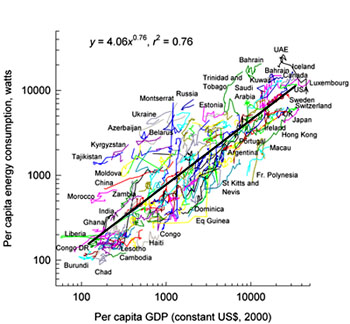
Economic growth depends on energy supply. In this day and age, large increases in energy will be required to fuel economic growth, increase standards of living and lift developing nations out of poverty. It is far from certain, however, whether existing supplies and technologies will be able to meet this demand. These are the conclusions of research published in the January 2011 issue of BioScience titled, "Energetic Limits to Economic Growth," by a group of ecologists at the University of New Mexico.
The researchers show a direct correlation between per capita energy use and per capita Gross Domestic Product across 220 countries and over 24 years from 1980-2003.
To listen to an interview with lead author and UNM Distinguished Professor of Biology James Brown visit: Brown interview.
"This relationship is strikingly similar to the relationship between rate of metabolism or energy use in organisms as a function of their body size, and for similar reasons" said UNM Distinguished Professor of Biology James Brown, the lead author. "Just as a body burns food energy to survive and grow, an economy must burn fuel in order to sustain itself and grow. Just as higher rates of food consumption are required to grow larger, more complex bodies, so higher rates of energy consumption are required to grow larger, more developed economies that provide greater levels of technological development and higher standards of living."
These relationships highlight fundamental constraints on both biological and socioeconomic systems that stem directly from the laws of thermodynamics and the principles of ecology.

The relationship between energy use and GDP across countries can be used to estimate the quantities of energy that will be required to meet expected population and economic growth in the next 15 years. Assuming that the world population increases to eight billion and the global economy continues to grow at four percent per year, energy supply will need to be doubled by 2025. And to bring the entire world up to a standard of living equivalent to the U.S. or western Europe by 2025 will require more than 10 times current energy use. Currently, approximately 85 percent of global energy use comes from fossil fuels, oil, gas and coal, which are being rapidly depleted. The potential to substitute other sources is still uncertain.
The bottom line is that an enormous increase in energy supply will be required to meet the demands of projected population and economic growth. There appear to be only three options for the future including large increases in energy supply, which would require research, development, and implementation of new energy sources and technologies; large decreases in human population, which would allow existing supplies to be apportioned among fewer people; and lastly, large decreases in per capita energy use.
"Unfortunately, essentially all measures of standard of living are correlated with both GDP and energy use, so it will be difficult to improve quality of life and lift developing countries out of poverty without jeopardizing current standards of living in the most developed countries," said Brown.
"We hope the evidence and interpretations presented in our paper will call attention to the fundamental relationship between energy and economic growth that has been largely unappreciated by traditional economists and sustainability scientists."
To listen to an interview with lead author and UNM Distinguished Professor of Biology James Brown visit: Examining the Future of Energy Use.
To read the paper, visit: Energetic Limits to Economic Growth.
The paper is a product of an informal working group in the University of New Mexico's Program in Interdisciplinary Biological and Biomedical Sciences or PIBBS, funded by the Howard Hughes Medical Institute and the National Institutes of Health. Group members include James H. Brown, William R. Burnside, Ana D. Davidson, John P. DeLong, William C. Dunn, Marcus J. Hamilton, Norman Mercado-Silva, Jeffrey C. Nekola, Jordan G. Okie, William H. Woodruff and Wenyun Zuo.
Media contact: Steve Carr (505) 277-1821; e-mail: scarr@unm.edu